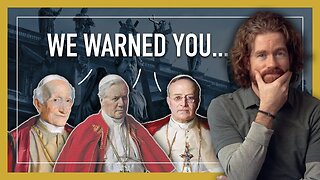The Biden Communion Debate
Support the channel by joining the Reinforcements at https://brianholdsworth.ca
Music written and generously provided by Paul Jernberg. Find out more about his work as a composer here: http://pauljernberg.com
In CS Lewis’ masterpiece, The Problem of Pain, he starts out the book by describing a religious experience that is both universal and not easily explained by natural means. He calls it numinous awe and he provides an example of what that experience might be like.
He says, imagine you were told that in the room next to you is a ghost. And how would you feel knowing that. You would, most likely, feel afraid, but not because of some natural danger. Most people aren’t afraid of what an inanimate presence might do to them, but of the fact that they exist and are nearby.
It is like an uncanny dread. Lewis escalates the analogy and goes on to say, now imagine instead, you were told that there was a great and powerful spirit in the next room. You would feel that same sense of dread, but also a shrinking humility and a struggle to cope with the presence of such a being. With that, you are on the fringes of what Lewis calls numinous awe.
And if it were true, that a great and powerful spirit was in close proximity to any of us, and we were convinced of this fact, I think any of us would have a similar reaction to what Lewis is describing.
We’d be terrified, awed, and humbled before it. Whatever our response is, it wouldn’t be casual and it certainly wouldn’t be the kind of scenario in which we feel inspired to assert ourselves before it demanding the dignity of respect and the rights we are entitled to.
That’s a relevant consideration for me when we talk about the sacrament of Holy Communion in the Catholic Church, because Catholics claim to believe that when the sacrifice of the mass is said, that bread and wine are transformed into the body, blood, soul and divinity of Jesus Christ – who is God incarnate.
This physical presence of God on earth, takes Lewis’ analogy to a whole new level. It isn’t just a great and powerful spirit in the next room, it’s the source of all being, the mind who thought up super black holes, the Mariana Trench, and the code of genetic life.
Imagine that particular, “great and powerful spirit” was in the next room and had business with you. What kind of feelings, thoughts, and behaviours would that produce in any of us if we were convinced of it? Whatever it is, it would be characterized by apprehension, humility, fear, awe, and countless other words that seem too inadequate to describe what that would be like.
That’s why I think it’s revealing when Catholics express their attitude about Holy Communion. Do they treat it like something they are entitled to, like a right, or do they express a shrinking reverence before it as a great privilege and honor that they are unworthy to receive?
Like in that example of the great and powerful spirit. Upon learning of its presence, nobody who actually believed the claim of its existence would then march into the next room demanding that the spirit give them whatever benefit might be derived from it.
Which is why I struggle to accept the claim that any Catholic who acts like Holy Communion is their entitlement truly believes it’s God incarnate that they are encountering in the sacrament. If they did, they’d be more likely to behave like a person who is experiencing the uncanny sensation of numinous awe.
Read the whole transcript at https://brianholdsworth.ca
-
 12:28
12:28
Brian Holdsworth
7 months ago $0.05 earnedThe Popes Warned Us About This
2171 -
 12:00
12:00
Dr. Eric Berg
1 day agoWhat Exercise Burns the Most Calories?
6.76K28 -
 4:48:29
4:48:29
LumpyPotatoX2
5 hours ago$10,000 PUBG Tournament w/GamersError - #RumbleTakeover
6.19K2 -
 3:22
3:22
One Bite Pizza Reviews
2 days agoBarstool Pizza Review - Marco Pizzeria & Restaurant (Branford, CT)
12K20 -
 41:46
41:46
Standpoint with Gabe Groisman
10 hours agoEp. 27. From GameStop to the NBA. Gabe Plotkin
14.3K3 -
 55:04
55:04
Matt Kohrs
7 hours agoThe Volatile Week Ahead || The MK Show
30K11 -
 26:18
26:18
Stephen Gardner
6 hours agoTop Republican UNLOADS on Democrats and Biden's MENTAL HEALTH!!
37.5K57 -
 44:30
44:30
Michael Franzese
2 days agoCancel Culture Backlash of My UK Tour | Michael Franzese
95.8K48 -
 35:12
35:12
Island Hopper TV
1 day agoFull Costa Rica Travel Guide 2024
55.8K33 -
 4:43
4:43
ParisDemers
1 day agoThis Diet Hack Changed My Life! (How To Get Ripped FAST!)
69.8K29